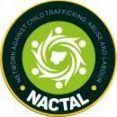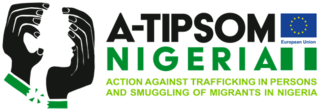
Trafficking of children is a form of human trafficking and is defined by the United Nations as the "recruitment, transportation, transfer, harboring, and/or receipt" kidnapping of a child for the purpose of slavery, forced labour, and exploitation. This definition is substantially wider than the same document's definition of "trafficking in persons". Children may also be trafficked for adoption.

Sex trafficking is human trafficking for the purpose of sexual exploitation. It has been called a form of modern slavery because of the way victims are forced into sexual acts non-consensually, in a form of sexual slavery. Perpetrators of the crime are called sex traffickers or pimps—people who manipulate victims to engage in various forms of commercial sex with paying customers. Sex traffickers use force, fraud, and coercion as they recruit, transport, and provide their victims as prostitutes. Sometimes victims are brought into a situation of dependency on their trafficker(s), financially or emotionally. Every aspect of sex trafficking is considered a crime, from acquisition to transportation and exploitation of victims. This includes any sexual exploitation of adults or minors, including child sex tourism (CST) and domestic minor sex trafficking (DMST).

Human trafficking and the prostitution of children has been a significant issue in the Philippines, often controlled by organized crime syndicates. Human trafficking is a crime against humanity.
Uzbekistan is a source country for women and girls who are trafficked to the United Arab Emirates (U.A.E.), Kazakhstan, Russia, Thailand, Turkey, India, Indonesia, Israel, Malaysia, South Korea, Japan and Costa Rica for the purpose of commercial sexual exploitation. Men are trafficked to Kazakhstan and Russia for purposes of forced labor in the construction, cotton and tobacco industries. Men and women are also trafficked internally for the purposes of domestic servitude, forced labor in the agricultural and construction industries, and for commercial sexual exploitation. Many school-age children are forced to work in the cotton harvest each year.

India has a very high volume of child trafficking. As many as one child disappears every eight minutes, according to the National Crime Records Bureau. In some cases, children are taken from their homes to be bought and sold in the market. In other cases, children are tricked into the hands of traffickers by being presented an opportunity for a job, when in reality, upon arrival they become enslaved. In India, there are many children trafficked for various reasons such as labor, begging, and sexual exploitation. Because of the nature of this crime, it is hard to track; due to the poor enforcement of laws, it is difficult to prevent. As such, there are only vague estimates of figures regarding the issue. India is a prime area for child trafficking to occur, as many of those trafficked are from, travel through or destined to go to India. Though most of the trafficking occurs within the country, there is also a significant number of children trafficked from Nepal and Bangladesh. There are many different causes that lead to child trafficking, with the primary reasons being poverty, weak law enforcement, and a lack of good quality public education. The traffickers that take advantage of children can be from another area in India, or could even know the child personally. Children who return home after being trafficked often face shame in their communities, rather than being welcomed home.
The United Nations Global Initiative to Fight Human Trafficking (UN.GIFT) is a multi-stakeholder initiative providing global access to expertise, knowledge and innovative partnerships to combat human trafficking.
Transnational efforts to prevent human trafficking are being made to prevent human trafficking in specific countries and around the world.
Niger is a source, transit, and destination country for children and women subjected to trafficking in persons, specifically forced labor and forced prostitution. Caste-based slavery practices, rooted in ancestral master-slave relationships, continue primarily in the northern part of the country. Children are trafficked within Niger for forced begging by religious instructors known as marabouts; forced labor in gold mines, agriculture, and stone quarries; as well as for involuntary domestic servitude and forced prostitution. The ILO estimates at least 10,000 children work in gold mines in Niger, many of whom may be forced to work. Nigerien children, primarily girls, are also subjected to commercial sexual exploitation along the border with Nigeria, particularly in the towns of Birni N'Konni and Zinder along the main highway, and boys are trafficked to Nigeria and Mali for forced begging and manual labor. There were reports Nigerien girls entered into "false marriages" with citizens of Nigeria, Saudi Arabia, and the United Arab Emirates: upon arrival in these countries, the girls are often forced into involuntary domestic servitude. Child marriage was a problem, especially in rural areas, and may have contributed to conditions of human trafficking. Niger is a transit country for women and children from Benin, Burkina Faso, Gabon, Ghana, Mali, Nigeria, and Togo en route to Northern Africa and Western Europe; some may be subjected to forced labor in Niger as domestic servants, forced laborers in mines and on farms, and as mechanics and welders. To a lesser extent, Nigerien women and children are sometimes trafficked from Niger to North Africa the Middle East, and Europe for involuntary domestic servitude and forced commercial sexual exploitation."
Nigeria is a source, transit, and destination country for women and children subjected to trafficking in persons including forced labour and forced prostitution. The U.S. State Department's Office to Monitor and Combat Trafficking in Persons placed the country in "Tier 2 Watchlist" in 2017. Trafficked people, particularly women and children, are recruited from within and outside the country's borders – for involuntary domestic servitude, sexual exploitation, street hawking, domestic servitude, mining, begging etc. Some are taken from Nigeria to other West and Central African countries, primarily Gabon, Cameroon, Ghana, Chad, Benin, Togo, Niger, Burkina Faso, and the Gambia, for the same purposes. Children from other West African states like Benin, Togo, and Ghana – where Economic Community of West African States (ECOWAS) rules allow for easy entry – are also forced to work in Nigeria, and some are subjected to hazardous jobs in Nigeria's granite mines. Europe, especially Italy and Russia, the Middle East and North Africa, are prime destinations for forced prostitution.Nigerians accounted for 21% of the 181,000 migrants that arrived in Italy through the Mediterranean in 2016 and about 21,000 Nigerian women and girls have been trafficked to Italy since 2015.
Devatop Centre for Africa Development is a youth-led nonprofit organization with aimed towards fighting and combating human trafficking, gender-based violence, child abuse, providing educational materials and academical support to vulnerable children, and empowering women and youth. The organization has been in the forefront of combating human trafficking and executing educational projects in Nigeria. It is registered with the Cooperate Affairs Commission Nigeria and since its establishment it has impacted over a million people through training, sensitization, assistance, donations and media.
Amina Titilayo Atiku-Abubakar is a Nigerian advocate of women and child rights and the wife of former vice president of the Federal Republic of Nigeria, Atiku Abubakar. She is the founder of Women Trafficking and Child Labour Eradication Foundation (WOTCLEF) and the initiator of the private bill that led to the establishment of National Agency for the Prohibition of Trafficking in Persons (NAPTIP).
The National Agency for the Prohibition of Trafficking in Persons (NAPTIP) is a Law Enforcement Agency of the Federal Government of Nigeria, founded on the 14th of July, 2003 by the Trafficking in Persons (Prohibition) Enforcement and Administration Act of 2003 to combat human trafficking and other similar human rights violations.

Crime in Cote d'Ivoire is prevalent and versatile across the West African country. The most common forms of crime include child labour, arms trafficking, terrorism and human rights abuse. Other less common, but still evident types of crime include cannabis and synthetic drug trade, sex trafficking, fauna and flora crimes.

Slavery has existed in various forms throughout the history of Nigeria, notably during the Atlantic slave trade and Trans-Saharan trade. Slavery is now illegal internationally and in Nigeria. However, legality is often overlooked with different pre-existing cultural traditions, which view certain actions differently. In Nigeria, certain traditions and religious practices have led to "the inevitable overlap between cultural, traditional, and religious practices as well as national legislation in many African states" which has had the power to exert extra-legal control over many lives resulting in modern-day slavery. The most common forms of modern slavery in Nigeria are human trafficking and child labor. Because modern slavery is difficult to recognize, it has been difficult to combat this practice despite international and national efforts.

Network Against Trafficking, Abuse and Labour (NACTAL) is an umbrella organisation of Nigerian non-governmental organizations engaged in advocacy and campaign for children's rights, anti-human trafficking, human rights abuse and child labour with some 220 member organizations in the six geopolitical zones of Nigeria and the Federal Capital Territory.

Action Against Trafficking in Persons and Smuggling of Migrants in Nigeria is an 11th European Development Fund project which is implemented in Nigeria by the International and Ibero-American Foundation for Administration and Public Policies (FIIAPP).
Idia Renaissance is a non governmental civil society organization based in Edo State, Nigeria. The organization organize activities around human trafficking, including reception of victims of human trafficking. Idia Renaissance was founded by Mrs. Eki Igbinedion, wife of Chief Lucky Igbinedion, a former governor of Edo State. In 2021, Idia Renaissance partnered with the United Nations High Commissioner for Refugees (UNHCR) to create awareness on human trafficking and sexual exploitation of women girls.
The rate of Human Trafficking in Edo State is alarming in this region of Nigeria. Located in Nigeria's Southern region, Edo State accounts for the highest proportion of irregular migrants in Nigeria. Young girls in Edo state are enticed with false promises to leave Nigeria and travel abroad for a better life, by the traffickers. The traffickers in this state also use manipulation, diabolical oath and debt bondage to control their victims and force them into slavery, forced labour, sex trafficking, and organ sales.
The 2015 Trafficking in Persons (Prohibition) Enforcement and Administration Act is an act which was initially passed in 2003 and amended in 2005 and 2015 by the Federal Government of Nigeria. The act was established to provide welfare and support for trafficked persons while also announcing penalties for offenses related to human trafficking in Nigeria. The act led to the establishment of the National Agency for the Prohibition of Trafficking in Persons (NAPTIP).
Sex trafficking in Nigeria is a form of human trafficking which involves reproductive slavery or commercial sexual exploitation Nigeria. This involves the exploitation and movement of people from one location to the other through coercsion, deception or forcibly to exploit them sexually for financial and sexual benefits.




